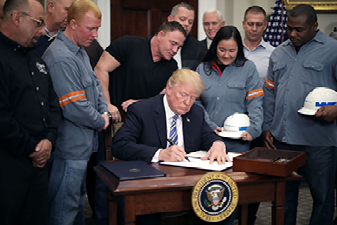|
By Katie Cross, Senior Associate,
Blakey & Agnew
In June, the United States began implementing tariffs on steel and aluminum imports and this month, the Administration imposed tariffs on $34 billion worth of exports from China. These announcements have triggered bipartisan concerns over a potential, or perhaps already happening, trade war.
President Trump announced the steel and aluminum tariffs on Mexico, Canada and the European Union imports, which had all previously been exempt from the duty, saying that the quantity of those materials being imported could pose a national security risk to the U.S. Additionally, the Administration argued the imports have caused U.S. production in the two industries to decline. Tariffs on various Chinese goods resulted from an investigation by the Office of the U.S. Trade Representative that found, among other things, China "uses foreign ownership restrictions to require or pressure technology transfers for U.S. companies to Chinese entities; imposes substantial restrictions of U.S. firms' investments and activities; and conducts and supports unauthorized intrusions into, and theft from, the computer networks of U.S. companies." The tariffs were, among other potential remedies, a solution proposed by the Administration as a "measure to address the acts, policies, and practices of China that are unreasonable or discriminatory and that burden or restrict U.S. commerce."
A tariff is essentially a tax on certain items being imported into the United States from other countries, in theory intended to make U.S.-produced versions more cost effective and therefore more competitive. Some steel and aluminum companies in the U.S. applauded the tariffs, with reports that companies were preparing to hire more workers, expecting an increase in demand for U.S. goods. Others have applauded the tariffs on Chinese products as rightly addressing the unfair advantage the country has in the global marketplace.
However, many in the U.S. fear that instead of making U.S. goods more competitive, the tariffs will hurt U.S. producers and consumers alike. Indeed, industries have already expressed concern over the retaliatory tariffs that the European Union, Mexico, Canada and China have put in place in response to the U.S.'s moves. From the pork industry, where one in four hogs is sold overseas, to soybean farmers, producing the second most valuable crop, as reported by the National Agricultural Statistics Service, industry representatives have been vocal in their concerns. Harley-Davidson's decision to move
|

overseas was well covered by the news and, according to the company, was made because of the retaliatory tariffs put in place by the European Union.
The American Association of Railroads (AAR) said in a statement that "the potential effect in a global market goes much deeper" than just hurting individual commodities or states. Indeed, AAR noted that the uncertainty over agricultural goods, such as grains, caused by the trade wars extend beyond the "fields onto the rails," potentially harming an industry that has 50,000 jobs and more than $5.5 billion in annual wages and benefits supported by trade.
U.S. ports have also noted that trade serves as a domestic job creator. The Port of Los Angeles noted that more than half the goods that pass through the port either have a destination or origin point of China. The Northwest Seaport Alliance (NWSA), made up of the ports of Tacoma and Seattle, noted that steel and aluminum imports through their ports exceeded $2.5 billion in 2017. The higher tariffs could jeopardize employment in a state where about 40 percent of jobs are related to international trade. NWSA also said in a release that around 76 percent of their containerized exports are made up of agricultural and forest products, meaning any retaliatory tariffs on these sectors would not just hurt the farmers who produce the goods but also the port from where they are exported.
Unique to the North American relationship, these tariffs are also putting extra strain on an already difficult renegotiating process for the North American Free Trade Agreement (NAFTA). The talks, which were originally supposed to conclude earlier this year, are currently stalled and with tensions rising as the trade war continues, there is concern for the renegotiation of the trilateral deal. But businesses are not giving up; the U.S., Canadian, and Mexican auto trade associations have all urged a renewed focus on the deal, noting that a new NAFTA agreement is in the best interest of all three countries.
Blakey & Agnew, LLC is a public affairs and
communications consulting firm based in
Washington, DC.
|


